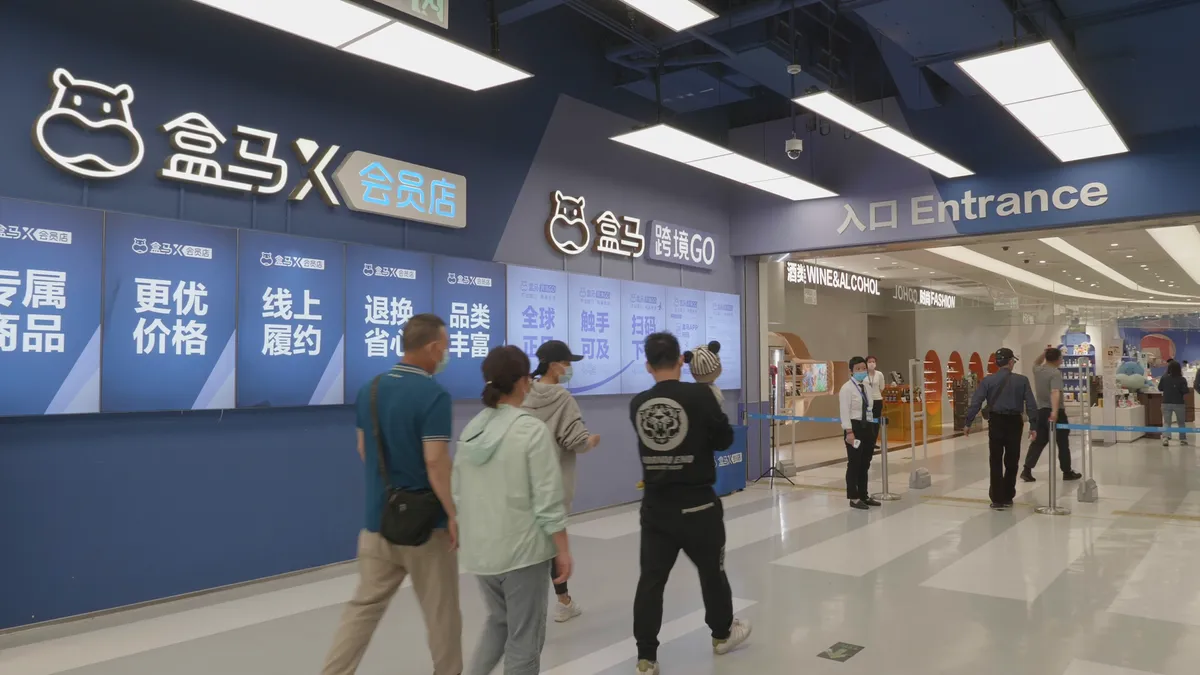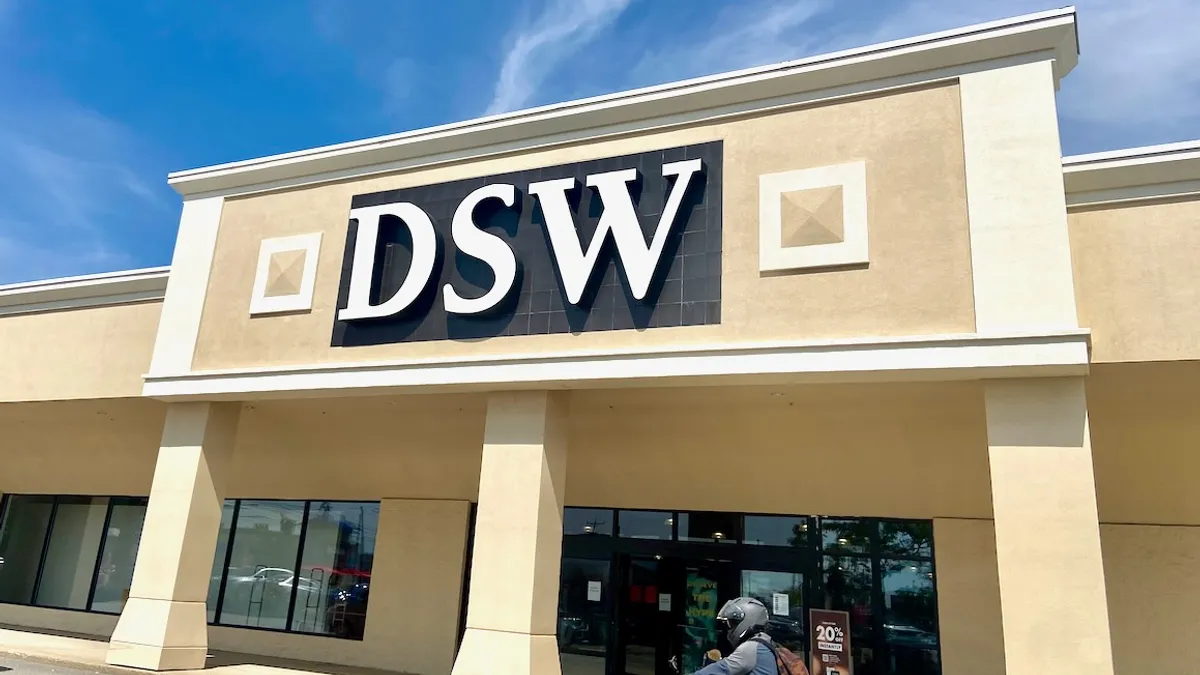When Chinese e-tailer Alibaba rolled out its Freshippo supermarket in 2016, U.S. observers took notice of what seemed to be the world's first true omnichannel store. Shoppers browse an array of fresh products, snapping QR codes with their phones to review sourcing details, recipes and other information. They can then choose to have items like fresh fish and lobster prepared for in-store dining, or to have everything delivered to their home in as little as 30 minutes.
Alibaba has built more than 200 Freshippo locations in China since then. It has also spread its "New Retail" philosophy across several other store formats, including grocery, with the goal of offering the most relevant shopping experiences in markets throughout the country of 1.4 billion people.
The newest among these is Store X, Alibaba's entry in the club warehouse format that took shape in the U.S. and is now taking China by storm. Warehouse stores run by Sam's Club and Germany-based Metro have operated in the country for years, and rising incomes and shoppers' desire for a new store experience have recently converged into a prime opportunity for the treasure-hunt shopping experience club stores offer, experts say.
When Costco landed in Shanghai in 2019, shoppers swarmed the store and forced it to close early on its first day.
"What happened in about 2016 is the market started to realize that this was the one retail format that was insulated from e-commerce's impact," said Jordan Berke, a former executive with Walmart China who now leads Tomorrow Retail Consulting. "It was the one format that continued to grow and that customers were still willing to drive to and loved the experience."
Store X, which opened its first 60,000-square-food location in Shanghai last October, takes the club shopping experience Costco customers are familiar with and runs it through Alibaba's digital ecosystem. The company uses its deep well of customer data to offer roughly 3,000 products at wholesale prices. This includes goods like salted nuts, beauty care products and fresh dumplings that are merchandised in the signature low-frills style inside boxes and large display cases. There's fresh produce and family-sized packages of prepared foods, many of them under the Freshippo Max private label brand, which accounts for around 20% of store sales. Sampling stations situated throughout the store let customers try out new products and dishes.
Shoppers can fill up a cart and check out at one of Store X's futuristic self-checkout terminals, which let shoppers pay using a QR code or facial recognition. Or, as with other Freshippo stores, they can scan the products they want and elect to have everything delivered to their home. Like Amazon in the U.S., Alibaba is able to tap into its extensive network of shipping channels and courier services. Store X products arrive in half day's time for shoppers that live within around 12 miles of the store, or in as little as 30 minutes if they live within two miles.
Freshippo membership, which grants access to Store X, costs around $40 per year and allows customers to accrue benefits like free delivery and grocery discounts across its store formats. According to Alibaba, members spend an average of $152 per visit to Store X.
Store X also features an imports-only section that includes departments like baby, beauty, kitchen appliances and alcoholic beverages. Members scan QR codes on the products they wish to buy, then receive everything within 30 minutes from a smart locker they access via a code sent to their phone.
True to the warehouse club model, Store X offers services like pet grooming and car repair departments in addition to its product assortment. Recent additions include an optometry department, supplement section and "Freshippo Garden" where shoppers can buy fresh-cut flowers.
The idea, said Ronald Cai, head of Freshippo Store X, is to offer an experience that draws shoppers out of their homes while still keeping them digitally engaged.
"We find that our consumers want to become members to have access to not just the products, but also the immersive experience that Store X offers as a whole," Cai said in a written response.
Freshippo currently operates three stores and plans to open eight more this year, a company spokesperson said. The company declined to say which cities it will expand to. Jiong Jiong Yu, a senior retail analyst for Asia at IGD who has researched Store X, said locations will range across a variety of markets.
"The stores will be mainly in Tier 1 and 2 cities, located inside shopping malls and will target high-spend local shoppers," she wrote in an email.
Targeting shoppers with an online-offline strategy
Alibaba is the leading online retailer in a country where shoppers are more digitally fluent than just about anywhere else in the world. But like Amazon in the U.S., it's reached the conclusion that expansion in grocery requires an online-offline strategy that combines a unique store experience with digital capabilities.
And like Amazon, Alibaba's strategy to date centers on testing multiple store formats that attempt to target demographics and shopper needs with pinpoint accuracy. Along with Store X and the traditional Freshippo format, Alibaba's other stores under the Freshippo brand include a farmers market store centered on fresh produce, a meal takeout spot, a miniature version of its supermarket model and a convenience store.
These various stores target a wide range of consumers and prioritize app-based shopping as well as online ordering. But there hasn't been a format until Store X that has effectively zeroed in on families, Berke said. That's especially important given China's recently revised family policy allowing up to three children per household.
"This really nicely fills that void in their portfolio of reaching those larger, more premium shopper families," Berke noted.
Operating multiple formats is a strategy U.S. grocers are employing as well, and tracking which Freshippo brands scale up, and how, could help point the way for retailers as they try to target specific markets and consumer segments. Store X, meanwhile, highlights the growing potential for digital innovation in the club store format. Sam's Club and BJ's Wholesale Club have embraced things like app innovation, scan-and-go checkout and curbside pickup. Even stubbornly analog Costco has expanded its same-day grocery service and begun trialing grocery pickup.
Yu said Alibaba has the advantage of extensive customer data that helps it determine store locations and craft highly localized product assortments. "Its big data is used at every step of the business decision-making process," she noted. Membership renewal rates, according to her, will be a key indicator of Store X's success in the months ahead.
"Both Sam's Club and Costco have high renewal rates, which are crucial to the paid-membership wholesale format," Yu wrote in an email.
Berke said he's bullish on Store X because of the popularity of the format and because the stores are more cost-effective to operate than traditional Freshippo grocery stores, with their pricey locations and automated conveyor belts that whisk orders from the retail floor to the delivery center.
He also said he expects the club model, which has expanded to Europe and South America in recent years, to continue its global march.
"There are other parts of the world that have not yet embraced the membership model, like India, but I think it will happen because of its high potential, and I think China is a great indicator of that," Berke said.
























